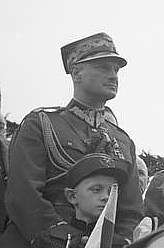Roman Abraham
Roman Józef Abraham (28 February 1891, Lwów – 26 August 1976, Warsaw) was a Polish cavalry general, commander of Wielkopolska Cavalry Brigade during German and Soviet Invasion of Poland in September 1939, in Battle of Bzura commander of Polish cavalry (combined cavalry unit). During the Second Republic, he was Brigadier General and, for a short period – from 1930 to 1931 – Abraham was also a member of the Parliament.[1]
Roman Józef Abraham | |
|---|---|
 Roman Abraham in 1938 | |
| Born | 28 February 1891 Lemberg, Austria-Hungary |
| Died | 26 August 1976 (aged 85) Warsaw, Poland |
| Service/ | Austro-Hungarian Army Polish Army |
| Rank | Brigadier General |
| Unit | Wielkopolska Cavalry Brigade Polish Collective Cavalry Brigade |
| Commands held | Commander of the Cavalry Brigade |
| Battles/wars | World War I Polish–Ukrainian War Polish–Soviet War World War II Invasion of Poland Battle of the Bzura Siege of Warsaw |
Early life and education
Abraham was born in Lwów in what was then Austria-Hungary (later in Poland, now Lviv, Ukraine). He was the son of Władysław Abraham, professor of Canon law and rector of the University of Lviv. He studied at the Jesuit School in Chyrów in Bąkowice, graduating in 1910.[2] He then studied at the Faculty of Philosophy and Law at Jan Kazimierz University in Lviv, graduating in 1915.
Military service
World War I
During World War I he served from August 1914 to October 1918 in the Austro-Hungarian army in the 1st Regiment of Uhlans of National Defense, fighting on the French, Romanian, Russian, Serbian and Italian fronts, ending his service as a lieutenant in the cavalry.[3]
Polish-Ukrainian War
At the end of World War I, he joined the Polish Military Cadres in Lviv. From 1 November 1918 in the reformed Polish Army in the rank of lieutenant, he was the commander of the Góra Strudenia sector in Lviv.
He created his own unit, later called "Straceńcami". The unit fought successfully in various defenses of Lviv, in defense of Persenkówka, and in Śródmieście.
The unit raised the Polish banner at the Lviv City Hall at dawn on 22 November, and on 24 November 1918 he was appointed a captain. However, his troops were accused of numerous robberies. An account, for instance, cited that the Galician unit he commanded could plunder from peasants living in captured Ukrainian villages, hauling all that could be transported to Lviv.[1]
From January to August 1919 he commanded an independent battalion, regiment and Operational Group in the division of the Colonel Władysław Sikorski. From August 1919, he was an officer in the operating department and an observer in the 59th Air Force Squadron. He also participated, among others in Polish-Ukrainian battles around Przemyśl.[4][5][4]
Polish-Bolshevik War
In 1920, Abraham defended the city of Lvov during the Polish-Bolshevik War. He was wounded during the conflict but he continued performing his duties, commanding his unit while being carried on a stretcher.[6]
World War II
He commanded the Wielkopolska Cavalry Brigade of army group Poznan, under General Tadeusz Kutrzeba. From 1939-45 he was a Prisoner of War in Oflag VII-A Murnau in Germany. A handwritten card sent by Abraham to his friend in Chicago from his prison has been preserved and is currently part of the Centralne Muzeum Jeńców Wojennych's collection.[6]
Decorations
- Virtuti Militari, Silver Cross (1922)
- Cross of Merit, Gold Cross (1930, 1938, 1940)
- Polonia Restituta, Officer's Cross (1933)
- Cross of Independence with Swords (1933)
- Virtuti Militari, Golden Cross (1961)
- Polonia Restituta, Commander's Cross (1970)
- Cross of Valor 5 times
- Lwów Defense Cross
- Légion d'honneur, Knight's Cross (France)
References
- Böhler, Jochen (2019). Civil War in Central Europe, 1918-1921: The Reconstruction of Poland. Oxford: Oxford University Press. pp. 146, 186. ISBN 9780198794486.
- "Sprawozdanie Zakładu Naukowo-Wychowawczego OO. Jezuitów w Bąkowicach pod Chyrowem za rok szkolny 1914/15 i 1915/16". Druk. J. Styfiego. 1916. Retrieved 11 November 2018.
- Generałowie II Rzeczypospolitej s. 12
- O kawalerii polskiej XX wieku s. 65
- "Jeszcze z czasu zimowych walk pod Lwowem opowiadano w wojsku o oddziale rotmistrza Abrahama i innych, które – zdobywając ruską wieś – zabierały chłopom wszystko co dało się unieść lub wywieść do tego stopnia , że nawet brudną bieliznę ze strychów ładowano na sanie i wywożono do Lwowa." Jerzy Konrad Maciejewski "Na hajdamaków" – "Karta" 77/2013 str. 77
- "Card sent from captivity by General Roman Abraham / wystawa_50 / Wystawy czasowe / Centralne Muzeum Jeńców Wojennych". www.cmjw.pl. Retrieved 2019-03-29.